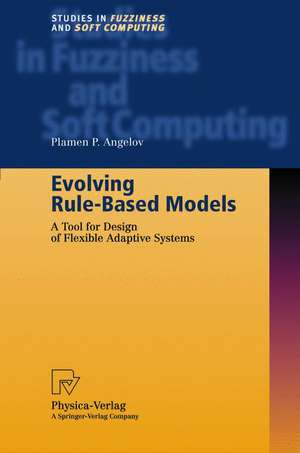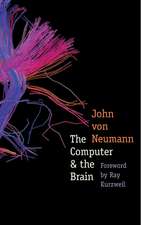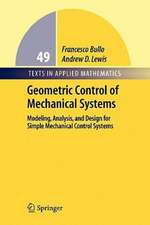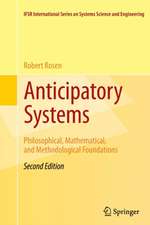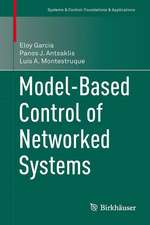Evolving Rule-Based Models: A Tool for Design of Flexible Adaptive Systems: Studies in Fuzziness and Soft Computing, cartea 92
Autor Plamen P. Angeloven Limba Engleză Hardback – 26 feb 2002
| Toate formatele și edițiile | Preț | Express |
|---|---|---|
| Paperback (1) | 637.13 lei 6-8 săpt. | |
| Physica-Verlag HD – 21 oct 2010 | 637.13 lei 6-8 săpt. | |
| Hardback (1) | 643.48 lei 6-8 săpt. | |
| Physica-Verlag HD – 26 feb 2002 | 643.48 lei 6-8 săpt. |
Din seria Studies in Fuzziness and Soft Computing
- 20%
 Preț: 999.85 lei
Preț: 999.85 lei - 20%
 Preț: 653.06 lei
Preț: 653.06 lei - 20%
 Preț: 872.98 lei
Preț: 872.98 lei - 20%
 Preț: 930.57 lei
Preț: 930.57 lei - 20%
 Preț: 1051.00 lei
Preț: 1051.00 lei - 20%
 Preț: 992.44 lei
Preț: 992.44 lei - 20%
 Preț: 655.85 lei
Preț: 655.85 lei - 20%
 Preț: 1001.86 lei
Preț: 1001.86 lei - 18%
 Preț: 954.14 lei
Preț: 954.14 lei - 20%
 Preț: 330.10 lei
Preț: 330.10 lei - 20%
 Preț: 333.04 lei
Preț: 333.04 lei - 20%
 Preț: 997.56 lei
Preț: 997.56 lei -
 Preț: 391.61 lei
Preț: 391.61 lei - 20%
 Preț: 647.79 lei
Preț: 647.79 lei - 20%
 Preț: 986.01 lei
Preț: 986.01 lei - 18%
 Preț: 958.56 lei
Preț: 958.56 lei - 20%
 Preț: 996.40 lei
Preț: 996.40 lei - 20%
 Preț: 999.35 lei
Preț: 999.35 lei - 15%
 Preț: 646.43 lei
Preț: 646.43 lei - 20%
 Preț: 651.57 lei
Preț: 651.57 lei - 20%
 Preț: 997.89 lei
Preț: 997.89 lei - 15%
 Preț: 641.03 lei
Preț: 641.03 lei - 20%
 Preț: 1009.74 lei
Preț: 1009.74 lei - 20%
 Preț: 992.62 lei
Preț: 992.62 lei -
 Preț: 388.72 lei
Preț: 388.72 lei - 18%
 Preț: 1223.43 lei
Preț: 1223.43 lei - 20%
 Preț: 651.42 lei
Preț: 651.42 lei - 18%
 Preț: 951.59 lei
Preț: 951.59 lei - 18%
 Preț: 948.61 lei
Preț: 948.61 lei
Preț: 643.48 lei
Preț vechi: 757.04 lei
-15% Nou
Puncte Express: 965
Preț estimativ în valută:
123.13€ • 131.67$ • 102.66£
123.13€ • 131.67$ • 102.66£
Carte tipărită la comandă
Livrare economică 18 aprilie-02 mai
Preluare comenzi: 021 569.72.76
Specificații
ISBN-13: 9783790814576
ISBN-10: 3790814571
Pagini: 232
Ilustrații: XIII, 214 p.
Dimensiuni: 155 x 235 x 18 mm
Greutate: 0.5 kg
Ediția:2002
Editura: Physica-Verlag HD
Colecția Physica
Seria Studies in Fuzziness and Soft Computing
Locul publicării:Heidelberg, Germany
ISBN-10: 3790814571
Pagini: 232
Ilustrații: XIII, 214 p.
Dimensiuni: 155 x 235 x 18 mm
Greutate: 0.5 kg
Ediția:2002
Editura: Physica-Verlag HD
Colecția Physica
Seria Studies in Fuzziness and Soft Computing
Locul publicării:Heidelberg, Germany
Public țintă
ResearchCuprins
1 Introduction.- I System Modelling: Basic Principles.- 2 Conventional Models.- 3 Flexible Models.- II Flexible Models Identification.- 4 Non-linear Approach to (Off-line) Identification of Flexible Models.- 5 Quasi-linear Approach to FRB Models (Off-line) Identification.- 6 Intelligent and Smart Adaptive Systems.- 7 On-line Identification of Flexible TSK-type Models.- III Engineering Applications.- 8 Modelling Indoor Climate Control Systems.- 9 On-line Modelling of Fermentation Processes.- 10 Intelligent Risk Assessment.- 11 Conclusions.- References.
Textul de pe ultima copertă
The objects of modelling and control change due to dynamical characteristics, fault development or simply ageing. There is a need to up-date models inheriting useful structure and parameter information. The book gives an original solution to this problem with a number of examples. It treats an original approach to on-line adaptation of rule-based models and systems described by such models. It combines the benefits of fuzzy rule-based models suitable for the description of highly complex systems with the original recursive, non iterative technique of model evolution without necessarily using genetic algorithms, thus avoiding computational burden making possible real-time industrial applications. Potential applications range from autonomous systems, on-line fault detection and diagnosis, performance analysis to evolving (self-learning) intelligent decision support systems.
Caracteristici
First approach to on-line generation and adaptation of rule-based models Illustration with real engineering examples Includes supplementary material: sn.pub/extras
